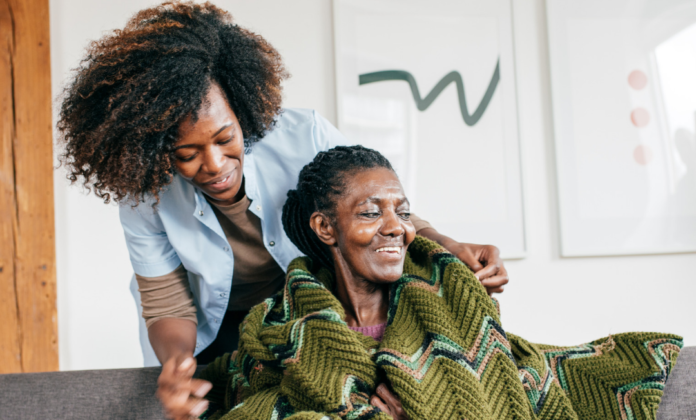Alzheimer’s disproportionately affects our community. A special report by the Alzheimer’s Association indicates that 19% of Black adults aged 65 and older have Alzheimer’s dementia compared with 10% of white older adults.
Alzheimer’s is a brain disease that is the predominant cause of dementia, a general term for memory loss and other cognitive abilities that are serious enough to interfere with daily life. Alzheimer’s is caused by damage to nerve cells in the brain, and it accounts for 60% – 80% of all dementia cases.
The flaws in the healthcare system, paired with the most significant risk factors, such as age and a family history of Alzheimer’s, only make things worse when it comes to diagnosis and treatment. According to the special report, the cumulative stress resulting from structural racism and the disparities in social and physical environments within our community may directly contribute to Alzheimer’s disease. Furthermore, this stress exacerbates the existing healthcare disparities that we encounter. It increases our vulnerability to other chronic conditions that themselves serve as risk factors for Alzheimer’s, including conditions like cardiovascular disease and diabetes.
Ethnic and cultural bias often influences our healthcare experiences, and unfortunately, Alzheimer’s disease is not an exception. African Americans tend to receive diagnoses at later stages of the disease; this limits the effectiveness of treatments that rely on early intervention. Additionally, although we are twice as likely to develop Alzheimer’s than our white counterparts, we are still underrepresented in current clinical trials. We represent less than 5% of participants in most new drug and therapy trials, according to the Global Alzheimer’s Platform Foundation. This data highlights the urgent need for change, especially considering genetic variations in drug responses across different races and ethnicities.
As we recognize the disparities affecting our community, we must familiarize ourselves with the signs of this disease. This knowledge can enable us to identify Alzheimer’s in our loved ones and even in ourselves.
The Stages and Symptoms The Alzheimer’s Association recognizes three stages of Alzheimer’s including:
- Early-stage Alzheimer’s (mild).
- Middle-stage Alzheimer’s (moderate).
- Late-stage Alzheimer’s (severe).
Common signs of early-stage Alzheimer’s are:
- Producing the right word or name.
- Remembering names when introduced to new people.
- Having difficulty performing tasks in social or work settings.
- Forgetting material that was just read.
- Losing or misplacing a valuable object.
- Experiencing increased trouble with planning or organizing.
In this stage, people usually maintain their independence regarding their day-to-day lives, but they may experience memory lapses. Although the symptoms aren’t always apparent, close family and friends can sometimes identify the shift.
Middle-stage Alzheimer’s is usually the longest stage.
It can last for many years. During this time, dementia symptoms are more pronounced as damage to nerve cells in the brain can make it difficult for people to express themselves and perform their typical tasks independently.
In this stage, you may notice the following symptoms:
- Being forgetful of events or personal history.
- Feeling moody or withdrawn, especially in socially or mentally challenging situations.
- Having trouble recalling information about themselves, like their address or telephone number and the high school or college they attended.
- Experiencing confusion about where they are or what day it is.
- Requiring help choosing proper clothing for the season or the occasion.
- Having trouble controlling their bladder and bowels.
- Experiencing changes in sleep patterns, such as sleeping during the day and becoming restless at night.
- Showing an increased tendency to wander and become lost.
- Demonstrating personality and behavioral changes, including suspiciousness and delusions or compulsive, repetitive behavior like handwringing or tissue shredding.
In the final stage of Alzheimer’s, the dementia symptoms are severe.
People lose their ability to respond to their environment, carry on a conversation, and, eventually, control movement. They may still say words or phrases, but initiating engagement in the late stage becomes difficult. As their memories and cognitive skills continue to worsen, significant changes can occur in their personalities.
Symptoms include:
- Need for around-the-clock assistance with daily personal care.
- Lose awareness of recent experiences and their surroundings.
- Experience changes in physical abilities, including walking, sitting, and swallowing.
- Have difficulty communicating.
- Become vulnerable to infections, especially pneumonia.
Navigating the Conversation of Alzheimer’s with a Loved One
If you suspect that your loved one is experiencing Alzheimer’s, take the initiative to foster open communication about the topic. Some people in the early stages of dementia can identify their memory lapses, and if approached gently, they may be relieved to talk about it. When talking with your loved one, use your knowledge of their personality and preferences to tailor your approach. Brace yourself for a range of emotions.
While some individuals are relieved to discuss their experiences, others may react with denial or anger. Try to emphasize your concern for the person and refrain from prematurely labeling their symptoms as Alzheimer’s. Instead, encourage them to explore this specific term with a medical professional.
If the individual you’re concerned about has a support system beyond you, consider reaching out to them. Ask if they have noticed any of the concerns you’ve observed. This can help you confirm your judgment and set the initial stages of a solid foundation of support as your loved one navigates this disease.






